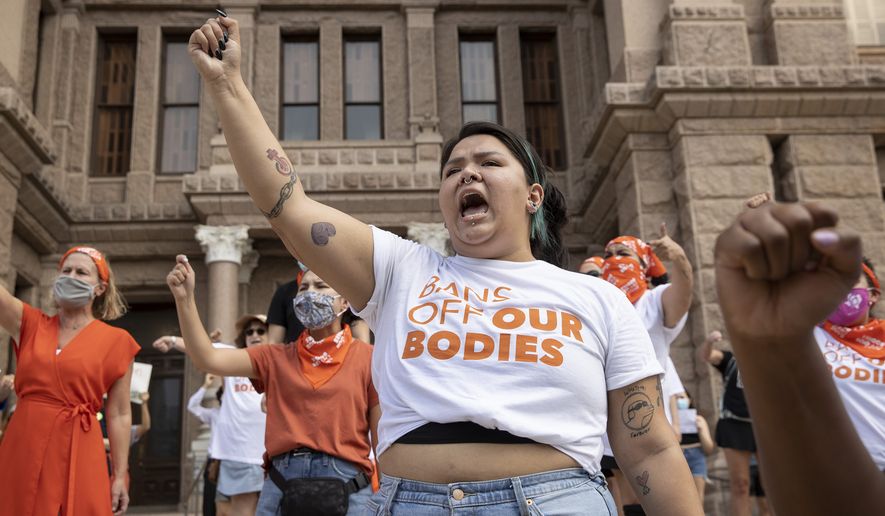Pro-choice advocates in Texas found themselves in an “unprecedented and complicated situation” Wednesday after the Supreme Court had failed to act on emergency requests to block a state law banning abortions after six weeks of pregnancy. Later that day, the high court ruled to keep the Texas law in place.
Clinics in Oklahoma and Kansas took in Texans who had traveled hundreds of miles for abortions, said officials from Trust Women clinics in Wichita and Oklahoma City. Clinics in Texas had to turn away women from their waiting rooms.
“This morning, I woke up feeling deep sadness. I’m worried. I’m numb,” said Amy Hagstrom Miller, CEO of Whole Woman’s Health. “We are now in an unprecedented and complicated situation.”
She said her clinic performed its last abortion at 11:56 p.m. Tuesday. The law took effect at midnight.
The Texas law prohibits abortions after a fetal heartbeat is detected, usually around six weeks of gestation.
Abortion providers challenged the legislation at the Supreme Court this week, arguing that most women do not even know they are pregnant at that stage.
SEE ALSO: Supreme Court divides 5-4, leaves Texas six-week abortion ban in place
The high court, which has a 6-3 conservative majority, had not weighed in on the law as of Wednesday afternoon. Later, near midnight, the court divided 5-4 to keep the Texas law in place.
The Texas law allows private citizens, not government officials, to sue abortion providers for violating the ban.
Jamie L. Manson, president of Catholics for Choice, said the law runs afoul of the Constitution and establishes vigilante justice.
“By turning enforcement of the law over to random private citizens across the country, Texas lawmakers have created a vigilante system to hunt down and terrorize anyone in their state who seeks to terminate a pregnancy, and placed a cash bounty on their heads to boot,” Ms. Manson said.
“In Texas, it is now open season on women, girls, other pregnant people, doctors and medical professionals, as well as the abortion funds, practical support networks, clergy and activists who work tirelessly to ensure access to basic health care,” she said.
The Center for Reproductive Rights, the American Civil Liberties Union and allied groups filed a lawsuit this year to block the legislation. They said it would force abortion providers to spend massive amounts of money defending themselves in court and subject them to harassment.
They said the restriction violates Supreme Court precedent protecting a woman’s right to an abortion and would ban roughly 85% of abortions in the state, forcing clinics to close.
Among those they are suing are state judges, clerks and Texas Attorney General Ken Paxton.
Texas Gov. Greg Abbott, a Republican, signed the legislation in May. The law allows anyone who successfully sues someone who assists in abortion after six weeks of gestation to receive $10,000.
The Texas defendants filed court papers Tuesday with the high court. They argued that the abortion providers lack standing to bring the lawsuit because they can’t show the defendants have caused them sufficient harm to get into court.
On Tuesday, a Travis County judge issued a restraining order in an attempt to prevent a group of pro-life advocates from suing certain individuals.
President Biden and House Speaker Nancy Pelosi, California Democrat, shamed the Texas restriction and vowed to defend a woman’s right to access abortion.
“This extreme Texas law blatantly violates the constitutional right established under Roe v. Wade and upheld as precedent for nearly half a century,” the president said. “The Texas law will significantly impair women’s access to the health care they need, particularly for communities of color and individuals with low incomes.”
White House press secretary Jen Psaki said one option for Democrats in Washington to halt the restrictions on abortion services is for Congress to codify Roe v. Wade.
An NBC News poll published Wednesday showed that 54% of adults said abortion should be legal in “all or most cases.” Forty-two percent said it should be illegal.
Pro-life advocates and conservative states have been trying to chip away at the 1973 Supreme Court ruling in the case of Roe v. Wade that women have a right to abortion.
They said Texas’ ban after six weeks was a step in the right direction.
Jeanne Mancini, president of the March for Life, said the legislation “highlights the humanity of children in the womb.”
“States have the right to act on what science and ethics clearly tell us, which is that these children have their whole life ahead of them and deserve our protection. Pro-life legislators in Texas and Governor Abbott deserve credit for their efforts to defend vulnerable human life,” Ms. Mancini said.
Marjorie Dannenfelser, president of the Susan B. Anthony List, said Wednesday was a “historic moment.”
“We’re excited to see the Heartbeat Act save lives starting today and stand with our allies on the front lines serving mothers and families,” Ms. Dannenfelser said. “The American people are eager to humanize our extreme, outdated abortion laws. This law reflects the scientific reality that unborn children are human beings, with beating hearts by six weeks.”
At least eight states have tried to ban abortion after six weeks, but none of those laws has gone into effect, according to the Guttmacher Institute, a pro-choice research group.
Texas has attempted to enact strict abortion restrictions in the past. In 2016, the high court struck down some of the state’s requirements on abortion providers, but more than half of the state’s abortion clinics had to close before the justices stepped in, according to The Associated Press.
The Supreme Court has agreed to decide in its next term whether Mississippi’s ban on abortion after 15 weeks runs afoul of Roe v. Wade.
• Alex Swoyer can be reached at aswoyer@washingtontimes.com.




Please read our comment policy before commenting.